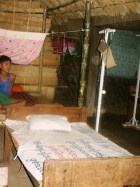Pourquoi des sanctions ? Sont-elles efficaces ? Face à la répression des manifestations de 1988, la communauté internationale prit des sanctions.
Début 1990, elles concernaient pour les Etats-Unis l’interdiction de vente d’armes, et le refus de visas pour la junte. Elles s’élargirent en 1997, avec la loi Cohen-Feinstein interdisant tout investissement américain. En 2003, le Burmese Freedom and Democracy Act (U.S.A.) interdit l’importation de tout produit birman, les prêts, les transferts de devises, et gela les avoirs de la junte.
L’Union européenne exclut la Birmanie en 1997 du système de préférence généralisé puis élargit les sanctions en 2011, avec l’embargo sur les armes, l’interdiction d’entrée dans l’UE de 375 membres et proches du régime, un gel de leurs avoirs, l’interdiction d’investir et d’importer bois, métaux, minerais, pierres précieuses ou semi-précieuses, et la limitation des relations diplomatiques.
En 1973, la Banque mondiale accordait en 1973 des prêts à la Birmanie à hauteur d’US $ 752 millions et la BAD pour US $ 530 millions dont plus de la moitié dans le secteur agricole et 12 % la santé. Elle stoppa son aide. Les investissements étrangers passèrent d’US $ 1 milliard/an au début des années 1990, à US $ 85 millions en 1997. Les 150 entreprises occidentales du pays fermèrent, entraînant la perte de 70 à 80 000 emplois.
Les sanctions stoppèrent la modernisation de l’industrie et l’accès aux nouvelles technologies ; elles furent un frein considérable au développement, et participèrent à la généraisation de la pauvreté.
Le pays fut exclu des programmes d’aide internationaux, alors que la part du budget consacrée à la santé était extrêmement faible (0,4 %), contre, dans les pays voisins 1,5 % des moyens publics.
L’impact des sanctions sur la junte resta limité : pour seul exemple, Than Shwe acheta à la Chine en 1992, des armes arrivant du Portugal, transitant par Singapour en violation totale de l’embargo. Alors que la Chine était elle-même isolée à la suite de la répression des manifestations de Tiananmen en juin 1989, une commande incluait avions de chasse, tanks, artillerie de défense anti-aérienne, munitions et bateaux. Enfin, sous la pression de groupes militants, le tourisme resta limité, (200 000 touristes en 2008 contre 6 millions en Thaïlande).
Les Birmans interrogés qualifient les sanctions de double peine et demandent si la démocratie s’impose par des sanctions.
Depuis que la Birmanie a repris sa place sur la scène internationale et que des réformes semblaient voir le jour, les sanctions sont en partie levées.
Why sanctions? Are they effective? Faced with the repression of the demonstrations of 1988, the international community took sanctions.
At the beginning of 1990, they concerned for the United States the prohibition of the sale of arms, and the refusal of visas for the junta. They expanded in 1997, with the Cohen-Feinstein law prohibiting all American investment. In 2003, the Burmese Freedom and Democracy Act (U.S.A.) banned the importation of any Burmese product, loans, currency transfers, and frozen the junta’s assets.
The European Union excluded Burma in 1997 from the generalized preference system and then expands the sanctions in 2011, with the arms embargo, the ban on EU entry of 375 members of the regime, a freezing of their assets, the prohibition on investing in and importing wood, metals, minerals, precious or semi-precious stones, and the limitation of diplomatic relations.
In 1973, the World Bank granted loans to Burma of US$752 million and the Afdb for US$530 million, more than half of which were in the agricultural sector and 12% in health. It stopped its aid. Foreign investment increased from US$1 billion/year in the early 1990s to US$85 million in 1997. 150 western companies closed, causing a loss of 70,000 to 80,000 jobs.
The sanctions stopped the modernization of industry and the access to new technologies; they were a considerable obstacle to development, and contributed to the generalization of poverty.
The country was excluded from international aid programmes, while the share of the budget devoted to health was extremely low (0.4%), against, in neighbouring countries, 1.5% of public resources.
The impact of the sanctions on the junta remained limited: for one example, Than Shwe bought weapons from China in 1992 from Portugal, passing through Singapore in total violation of the embargo. While China itself was isolated following the repression of the Tiananmen protests in June 1989, a command included fighter planes, tanks, anti-aircraft artillery, ammunition and ships. Tourism remained limited (200,000 tourists in 2008 against 6 million in Thailand).
The Burmese questioned describe the sanctions as double punishment and ask whether democracy is imposed by sanctions.
Since Burma regained its place on the international stage and reforms appeared to be taking place, sanctions have been partially lifted.
